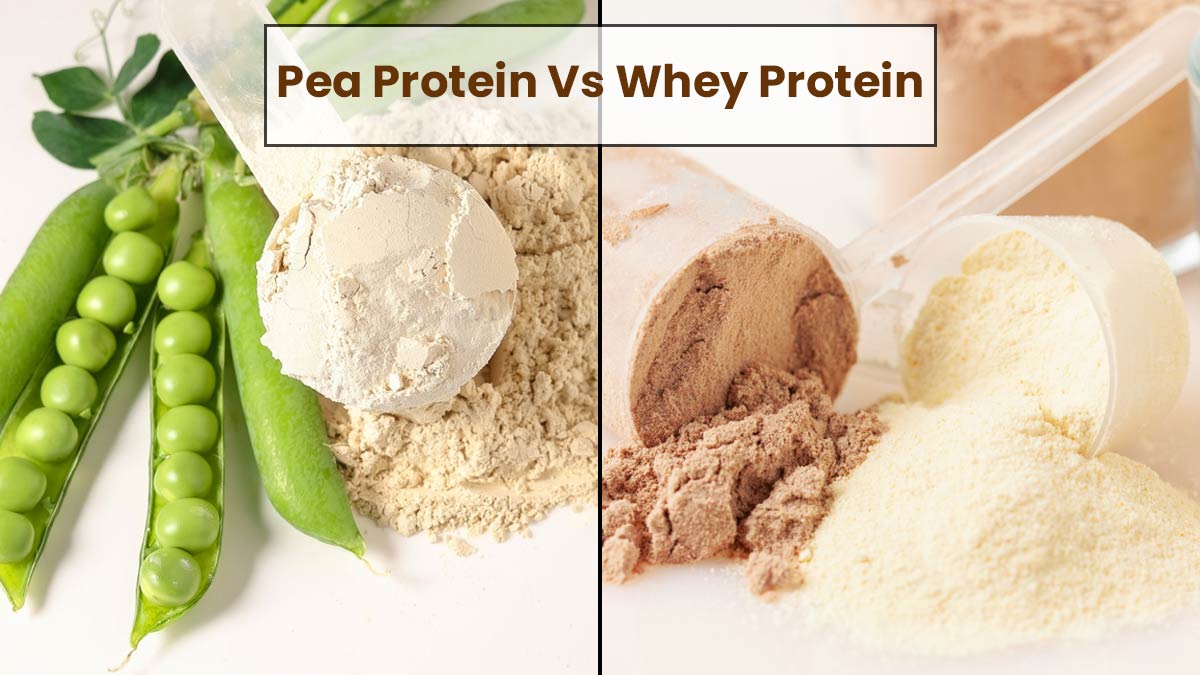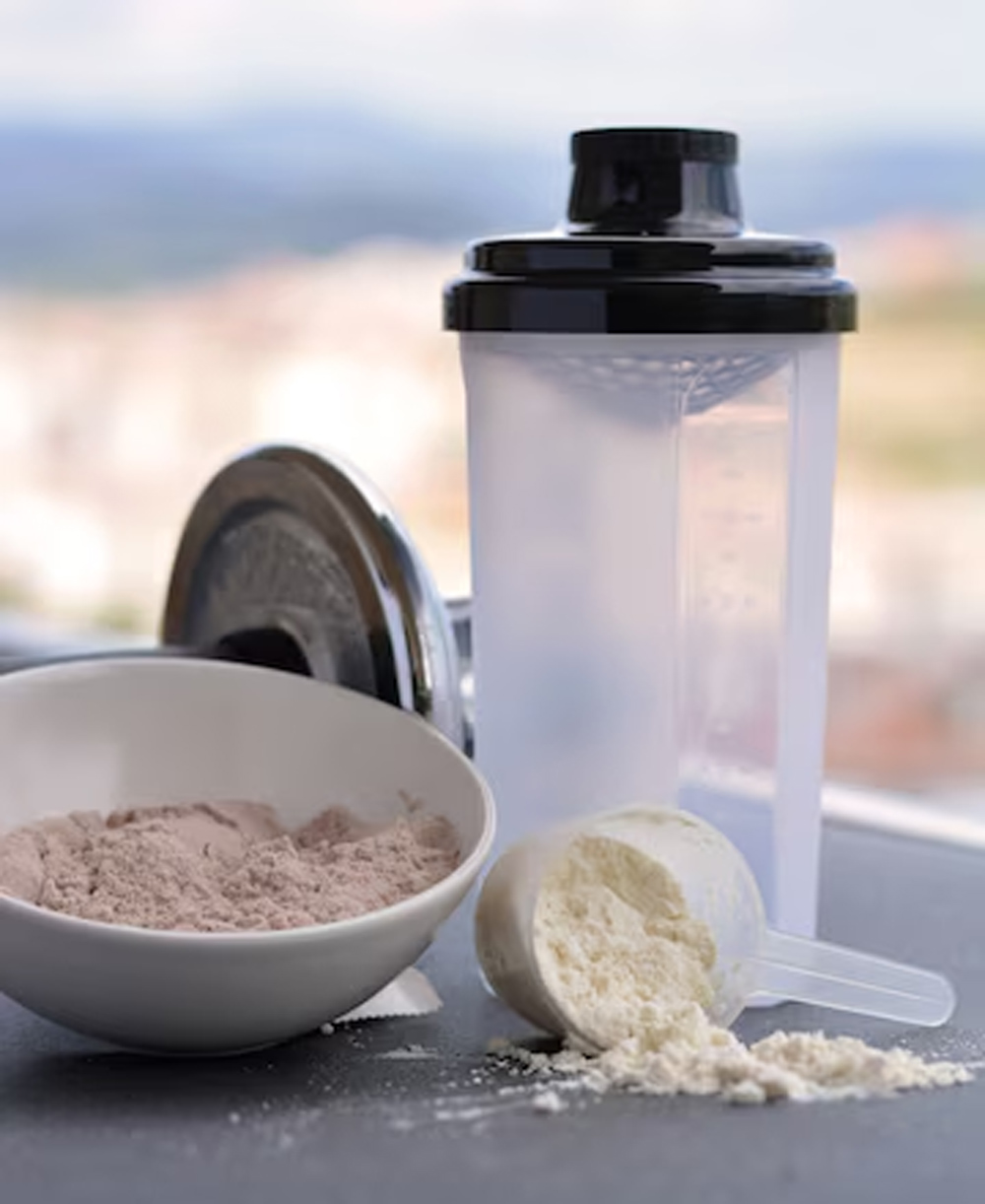
Most fitness enthusiasts often find themselves wondering which protein supplement is the best suited for their health. Two popular choices that frequently come up are pea protein and whey protein. But what sets them apart? How do they compare in terms of promoting muscle growth, facilitating recovery, and aiding digestion? We spoke to our expert Bhakti Kapoor, Nutritionist (MSc Food Science and Nutrition), Green Protein, who explained their differences and which one is better and why.
Table of Content:-
What Are The Differences Between Pea Protein And Whey Protein
Kapoor listed the key differences between pea and whey protein as follows:

Source and Composition
- Pea Protein: Derived from yellow split peas, pea protein is a plant-based protein that boasts a rich profile of essential amino acids, particularly Branched-Chain Amino Acids (BCAAs), which are crucial for muscle repair and growth.
- Whey Protein: This protein is a byproduct of cheese-making which is sourced from milk. It contains all nine essential amino acids, classifying it as a complete protein with a high concentration of BCAAs.
According to a 2018 study, whey protein powder contains a slightly higher protein content per serving compared to pea powder.
Allergenicity
- Pea Protein: Great for people with dairy, gluten, or soy allergies since it’s hypoallergenic.
- Whey Protein: Contains lactose, which can pose problems for those who are lactose intolerant or allergic to dairy products.
Environmental Impact
- Pea Protein: More sustainable, with lower greenhouse gas emissions and reduced water usage compared to animal-derived proteins.
- Whey Protein: It has a higher environmental footprint due to the resources needed for dairy farming and the byproducts of the cheese-making process.
Effectiveness for Muscle Growth and Recovery

Here's a comparison of how pea and whey protein impact muscle growth and recovery, as listed by the expert:
Muscle Growth
- Whey Protein: Many people love whey protein because it gets absorbed quickly. It has all the amino acids your muscles need, making it highly effective for enhancing muscle protein synthesis post-workout.
- Pea Protein: When it comes to building muscle mass, pea protein is almost as good as whey protein. It's packed with important amino acids that help repair and grow muscles, although it is absorbed more slowly.
Recovery
- Whey Protein: It is ideal for immediate post-workout recovery due to its quick absorption rate, delivering essential amino acids promptly.
- Pea Protein: It provides a more gradual release of amino acids, which is beneficial for sustained recovery over longer periods.
Digestive Dynamics

Digestibility
- Whey Protein: It is known for its rapid digestion, resulting in a swift increase in plasma amino acids. However, it can cause digestive discomfort for lactose-intolerant individuals.
- Pea Protein: Pea protein is usually gentle on the stomach, providing a steady supply of amino acids without causing digestive problems for most people.
Digestive Sensitivity
- Whey Protein: Contains lactose, which can lead to bloating and gas for those with lactose intolerance.
- Pea Protein: It's free from common allergens, making it a gentle option for easier digestion.
Also Read: Vegetarian Diet: Here're 7 Protein-Rich Breakfast Options You Can Add To Your Diet
Recommendations for New Users
When deciding between pea protein and whey protein, consider the following factors, as listed by Kapoor:
- Dietary Preferences: Pea protein is ideal for vegetarians, vegans, or those avoiding animal products, while both options are suitable for omnivores.
- Allergies and Intolerances: Pea protein is preferable for individuals with lactose intolerance or dairy allergies.
- Environmental Concerns: Pea protein is more eco-friendly than other proteins.
- Digestive Health: Since pea protein is hypoallergenic, it may be more suitable for those who suffer from sensitive digestion.
Potential Side Effects and Considerations
Whey Protein
- Side Effects: Some people may experience digestive discomfort, such as bloating, gas, and diarrhoea, especially those who are lactose intolerant.
- Considerations: Opt for high-quality whey protein isolate or hydrolysed whey, which contain lower lactose levels and are easier to digest.
Pea Protein
- Side Effects: Generally well-tolerated, though some may experience mild bloating or gas.
- Considerations: Select high-quality pea protein products to avoid additives or fillers that could cause digestive issues.
Bottomline
Kapoor concluded, “Both pea protein and whey protein have their unique advantages and potential drawbacks. Pea protein offers a sustainable, hypoallergenic, and easily digestible alternative to whey protein. Whether you're focused on muscle growth, recovery, or overall digestive health, understanding these differences can help you make an informed decision tailored to your specific needs and lifestyle preferences.”
[Disclaimer: This article contains information provided by an expert and is for informational purposes only. Hence, we advise you to consult your own professional before making any dietary changes, especially if you are dealing with any health issues.]
Also watch this video
How we keep this article up to date:
We work with experts and keep a close eye on the latest in health and wellness. Whenever there is a new research or helpful information, we update our articles with accurate and useful advice.
Current Version